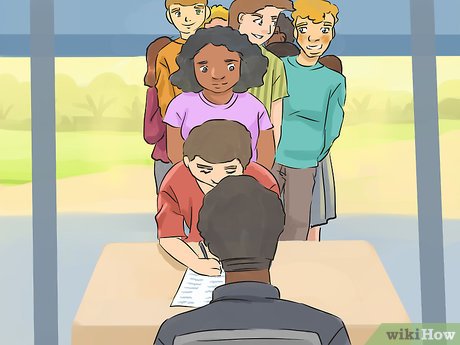How to Transition from High School to College
Method 1 of 3:
Succeeding Academically
-
 Attend all of your classes when they're scheduled. Unlike high school, no one forces you to go to your classes throughout the day. Even if you don't feel like attending class on a certain day, go anyway so you don't miss any important information or lose any class points. When you're in class, give your professor your full attention so you can do well.[1]
Attend all of your classes when they're scheduled. Unlike high school, no one forces you to go to your classes throughout the day. Even if you don't feel like attending class on a certain day, go anyway so you don't miss any important information or lose any class points. When you're in class, give your professor your full attention so you can do well.[1]- Avoid scheduling classes that you know you'll have difficulty getting to. For example, don't take an 8 AM class if you don't like waking up early.
- It's okay to miss class if you feel sick or there's an emergency. Many professors allow a few unexcused absences from their classes per semester. Send an email to your professor to let them know you're missing class and ask other students in class to see what you've missed.
- Pick electives that you're interested in to explore new subjects so you feel excited to go to all your classes.
- Check your student email every day since professors may cancel classes or send out important information.
-
 Study hard even if you didn't need to high school. College courses are typically more in-depth and have heavier coursework than high school. Take notes in class during lectures and from assigned reading to get a better understanding of the main lessons you're being taught. Study a little bit every night to stay familiar with the material rather than cramming for your test the night before.[2]
Study hard even if you didn't need to high school. College courses are typically more in-depth and have heavier coursework than high school. Take notes in class during lectures and from assigned reading to get a better understanding of the main lessons you're being taught. Study a little bit every night to stay familiar with the material rather than cramming for your test the night before.[2]- Try different study methods, such as using flashcards or rewriting your notes, to see what works best for you.
- Find a comfortable, quiet place that you can go to study. Try to go there at the same time each day so you can develop a study routine.[3]
- Ask questions during class if you're confused about a point during a lecture.
Tip: Keep your notes and assignments organized in separate folders or binders so you can easily find them when you need them.[4]
-
 Avoid procrastinating assignments until the last minute. Many college courses don't have a lot of in-class time to complete assignments or projects, so schedule time each day to actively work on them. Plan to spend the same time working on assignments outside of class as you spend attending lectures so you can easily finish all of your work on time.[5]
Avoid procrastinating assignments until the last minute. Many college courses don't have a lot of in-class time to complete assignments or projects, so schedule time each day to actively work on them. Plan to spend the same time working on assignments outside of class as you spend attending lectures so you can easily finish all of your work on time.[5]- Turn off your phone and stay off of social media while you're working on your assignments since they can be distracting.
- Start writing papers when they're assigned so you have time to reread and revise them before you need to turn them in.
- If you need to study for a test, try to study a little bit each day so you can familiarize yourself with the material.
-
 Visit professors during office hours to talk about coursework. College professors have office hours where they can meet with students individually to talk about assignments. Check your class's syllabus to see when your professor is available and go to their office. Talk about any assignments you're confused by or ask them about clarifications to their lectures. Pay attention to them as they explain the problems so you can have a better understanding of the material.[6]
Visit professors during office hours to talk about coursework. College professors have office hours where they can meet with students individually to talk about assignments. Check your class's syllabus to see when your professor is available and go to their office. Talk about any assignments you're confused by or ask them about clarifications to their lectures. Pay attention to them as they explain the problems so you can have a better understanding of the material.[6]- If you have another class or commitment when your professor has office hours, ask them if you can make an appointment when you're available. Unless they have another class running at that time, professors are willing to find time to talk to their students.
-
 Take advantage of on-campus tutors if you have trouble with assignments. Many departments at college have student tutors that are familiar with the material so they can help out with assignments. Check if there are any tutoring hours for the subject you have questions about and set up an appointment if you need to. When you go to the tutoring hours, bring your assignment with you so you can look over it with the tutor.[7]
Take advantage of on-campus tutors if you have trouble with assignments. Many departments at college have student tutors that are familiar with the material so they can help out with assignments. Check if there are any tutoring hours for the subject you have questions about and set up an appointment if you need to. When you go to the tutoring hours, bring your assignment with you so you can look over it with the tutor.[7]- If you need help researching topics for a paper or project, talk to librarians at the campus library since they can help steer you toward credible sources.
Method 2 of 3:
Maintaining Your Social Life
-
 Attend campus events to meet new people. Colleges usually have a variety of events that you can attend that are either free or have a student discount. Check your university's calendar online to see what events are happening around campus and pick a few that are interesting to you. Go to the events so you can socialize and get to know people who share similar interests with you.[8]
Attend campus events to meet new people. Colleges usually have a variety of events that you can attend that are either free or have a student discount. Check your university's calendar online to see what events are happening around campus and pick a few that are interesting to you. Go to the events so you can socialize and get to know people who share similar interests with you.[8]- Campus activities can include live music, sporting events, and guest lecturers.
- Check your email frequently since some universities send out daily or weekly newsletters that list all the events happening.
Tip: Limit the amount of time you spend on social media when you first start college so you can meet new people you're attending school with.
-
 Ask people in your dorm if they want to hang out. If you're living on campus, talk to the other people living in your building to see if they want to get together. You could invite them to watch a movie in your room, go get a meal together, or go to a campus event. While you're hanging out with the people from your dorm, ask them about their major or what they like to do to see if you'll get along with them. Be yourself around them so they get to know you well.[9]
Ask people in your dorm if they want to hang out. If you're living on campus, talk to the other people living in your building to see if they want to get together. You could invite them to watch a movie in your room, go get a meal together, or go to a campus event. While you're hanging out with the people from your dorm, ask them about their major or what they like to do to see if you'll get along with them. Be yourself around them so they get to know you well.[9]- Many times, your resident advisor (RA) will plan floor-wide events within the first few weeks so you can meet everyone that will be living around you.
-
 Put together a study group with other class members to work on assignments. If you want to make friends in the classes you're taking, reach out to a few people either in person or by email to see if they want to work on assignments together. Meet in a public place, such as the student center or library, so you can have a small group. Work through your assignments together and ask each other questions if you get confused by problems. As you study and work, ask the other people about themselves so you can get to know them.[10]
Put together a study group with other class members to work on assignments. If you want to make friends in the classes you're taking, reach out to a few people either in person or by email to see if they want to work on assignments together. Meet in a public place, such as the student center or library, so you can have a small group. Work through your assignments together and ask each other questions if you get confused by problems. As you study and work, ask the other people about themselves so you can get to know them.[10]- Once you get comfortable studying with some of the people in your class, ask them to hang out without doing classwork so you can develop your friendship even more.
-
 Get involved with extracurricular clubs and activities. Your college campus will have multiple clubs and organizations you can join to meet other people with similar interests. Look on your campus website to see what clubs and organizations are available and what times they meet. Attend one of the meetings for the club you join to see what they do and how you can get involved with them.[11]
Get involved with extracurricular clubs and activities. Your college campus will have multiple clubs and organizations you can join to meet other people with similar interests. Look on your campus website to see what clubs and organizations are available and what times they meet. Attend one of the meetings for the club you join to see what they do and how you can get involved with them.[11]- During the first few weeks, your campus may have an event where you can see all the clubs available to join. Attend the event so you can talk to the club organizers and meet new friends.
- Your campus may also offer intramural sports so you can compete against other students for fun and try new sports.
Method 3 of 3:
Managing Stress
-
 Set realistic expectations for yourself. College can be difficult to get used to since it's more challenging and there's more expected from you. Aim to do the best you possibly can and have a positive attitude toward your classes. Write your goals down so you can focus on them and track how well you're doing. Manage your time well so you can achieve your goals and avoid feeling discouraged with yourself.[12]
Set realistic expectations for yourself. College can be difficult to get used to since it's more challenging and there's more expected from you. Aim to do the best you possibly can and have a positive attitude toward your classes. Write your goals down so you can focus on them and track how well you're doing. Manage your time well so you can achieve your goals and avoid feeling discouraged with yourself.[12]- For example, while trying to get straight A's in all of your courses is a great goal, allowing yourself 1-2 B's will help you stay relaxed and feel less pressure.
- Don't compare yourself to other students since they may come from different backgrounds or have prior knowledge of a subject.
-
 Be responsible with your money. Going to college is one of the first times you might be responsible for your own finances, so make a budget so you can spend your money wisely. Try cooking meals a few times a week or going to free events rather than paid ones. If you need to make additional money, consider getting a job on nights and weekends so you can afford any expenses you have.[13]
Be responsible with your money. Going to college is one of the first times you might be responsible for your own finances, so make a budget so you can spend your money wisely. Try cooking meals a few times a week or going to free events rather than paid ones. If you need to make additional money, consider getting a job on nights and weekends so you can afford any expenses you have.[13]- If you're taking out student loans, only take out as much as you need for your tuition so you don't need to pay more back later.
Tip: Look for jobs on campus if you can since they're usually more flexible with their hours.
-
 Eat well and exercise to stay healthy. Many campuses have a variety of food options to choose from, so pick healthy options, such as salads, vegetables, and fruit, to include in your meal. Limit the amount of junk food or sugary drinks you have so you don't gain the 'freshman 15.' Find time 3-4 times a week to exercise either in your room or at a gym so you can stay fit and healthy while you're in school.[14]
Eat well and exercise to stay healthy. Many campuses have a variety of food options to choose from, so pick healthy options, such as salads, vegetables, and fruit, to include in your meal. Limit the amount of junk food or sugary drinks you have so you don't gain the 'freshman 15.' Find time 3-4 times a week to exercise either in your room or at a gym so you can stay fit and healthy while you're in school.[14]- It's okay to reward yourself with sweets or junk food every now and then, but don't let it become an unhealthy habit.
- See if your campus has a fitness center where you can go to work out with equipment. Fitness centers usually have an annual fee you need to pay for access.
-
 Get a good amount of sleep each night. You won't have a curfew when you're in college, so make sure you set aside at least 8-10 hours each night for sleep. Try to limit the amount of screen time you have before going to bed since it could affect how well you rest. Try to go to bed and wake up at a consistent time each day so your body develops a natural routine.[15]
Get a good amount of sleep each night. You won't have a curfew when you're in college, so make sure you set aside at least 8-10 hours each night for sleep. Try to limit the amount of screen time you have before going to bed since it could affect how well you rest. Try to go to bed and wake up at a consistent time each day so your body develops a natural routine.[15]- If you don't get enough sleep while you're in school, you may not be as focused or do as well in your classes.
- Many dorms have set quiet hours during the night so other people can't keep you awake late.
- Talk to your roommate if you have one to talk about when you want to sleep so you don't disturb one another.
-
 Set aside time for yourself to relax. Going to class and hanging out with other students can feel overwhelming, so use some of your free time to unwind from any stress. Take some time every day or at the end of the week to do something that's not related to your classes or socializing. Read a book, draw, journal, or do whatever makes you feel comfortable so you can unwind from anything you're stressed about.[16]
Set aside time for yourself to relax. Going to class and hanging out with other students can feel overwhelming, so use some of your free time to unwind from any stress. Take some time every day or at the end of the week to do something that's not related to your classes or socializing. Read a book, draw, journal, or do whatever makes you feel comfortable so you can unwind from anything you're stressed about.[16]- For example, instead of going out with friends on a Friday night, you might instead make yourself some tea and watch a movie alone.
-
 Talk to a counselor when you feel overwhelmed. Many schools have a student counseling program where you can talk about how you're feeling. Set an appointment with a counselor and talk about what's stressing you out and how you manage your time. The counselor may give you activities or things to practice when you feel stressed. Follow through with them to see if you feel calmer and attend future counseling sessions if you need to.[17]
Talk to a counselor when you feel overwhelmed. Many schools have a student counseling program where you can talk about how you're feeling. Set an appointment with a counselor and talk about what's stressing you out and how you manage your time. The counselor may give you activities or things to practice when you feel stressed. Follow through with them to see if you feel calmer and attend future counseling sessions if you need to.[17]- You can also reach out to your parents to talk.
Share by
Marvin Fry
Update 24 March 2020














